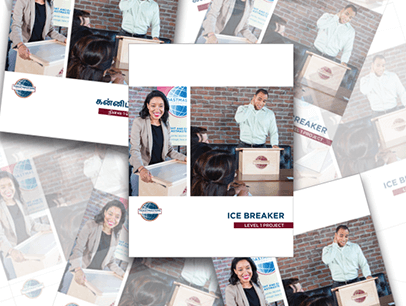
It’s the simplest assignment in your Toastmasters journey, but that doesn’t mean it’s easy.
“Just talk about yourself.”
As you prepare to give your inaugural Ice Breaker, the first prepared speech in Toastmasters, you’ll hear that a lot. Because that’s all it is: a short speech about yourself, with no rules about what you can and can’t say or how to say it. Easy, right?
Right.
If you’re like me, talking about yourself is a lot easier said than done. I can expound on any number of topics I know a lot about and a few I know nothing about. The one thing I know the most about—me—is the one I least care to discuss. Not in front of relative strangers, anyway.
And then there’s the fear.
You’re not the first to struggle with your Ice Breaker, and after you’ve given it—and you WILL give it—you’ll see many new Toastmasters wrestling with fear and uncertainty as they prepare to follow you to the white-knuckled spot on the lectern that you and so many others held on to for dear life.
The Ice Breaker concept has changed in recent years. Once, new members gave their 4- to 6-minute Ice Breaker speech and then moved on to complete nine projects covering basic speaking skills. Today, it’s an integral part of each Pathways path and can be used to share a different aspect of your life or simply to tell your club about your goals for the project.
But first things first: your very first Ice Breaker. Here’s some help for now and for when it’s your turn to help those who come after you with knocking knees and chattering teeth.
How to Keep Your Cool in Your First Ice Breaker
- Scared to start? Begin with Table Topics®.
“People are frightened, they’re scared, they aren’t experienced at speaking,” says Christopher Pritchard, DTM, of Naples Advanced Toastmasters in Naples, Florida. When a new member is struggling with preparing their Ice Breaker, Pritchard will ask them to speak during Table Topics about something they like to do. They’re halfway to the Ice Breaker and what do you know? They’re still standing.
- Make it all about you.
That’s right. For once, it really is about you. Talk about a favorite hobby, your last vacation, what you do for a living, something funny or intriguing about growing up, why you joined Toastmasters. My first Ice Breaker was about how “I Always Have to Be Different,” like using an Android phone when everyone I knew had an iPhone. You don’t have to be that elaborate or structured. Some of the most powerful Ice Breakers I’ve heard have been straightforward, unadorned stories from immigrants who talked about how they came to the United States. The beauty of using your personal story is that it’s easy to remember. And if you do forget part of it, well, who but you will know?
- Read the Ice Breaker project in the path you’re working on.
It will give simple, clear instructions on how to prepare and deliver the speech (see sidebar), including how to create an outline. Be sure to watch the videos, which are invaluable moral support. They feature Toastmasters talking about their Ice Breaker experiences and marveling at how much they enjoyed the project. Download them to your phone and play them when your feet start icing up.
- Write down your speech in some fashion.
You don’t have to write it word for word, although you can if you like. Make an outline, jot down a few key thoughts, create color-coded flash cards, see what works. After 12 years in Toastmasters, I still write my speeches and envy the people who can speak without a script. But that comes with an important addendum:
- Practice, practice, practice. And practice some more.
Run through it again and again until you’ve internalized your script and can speak naturally. In my opinion, no good speaker ever succeeded by “winging it,” and those who think they can haven’t listened to themselves ramble and stammer over material they aren’t sure of. I’ve interviewed several World Champions of Public Speaking and they all told me it takes a lot of practice to sound like you’re winging it.
- Relax and have fun.
Know that everyone has been where you are right now, and they want you to succeed. Listen to their feedback, which will probably be positive and supportive even when it’s about how you can improve.
And don’t be too quick to get off the stage. Drink in the applause and enjoy it—it will be the first of many ovations you can look forward to in Toastmasters.
Kate McClare, DTM , is a professional writer and editor who joined Toastmasters in 2011. She is a member of Miami Advanced Toastmasters Club in Kendall, Florida, and an Area Director for District 47, Southeast Florida and The Bahamas.
Related Articles

Personal Growth
Ice Breakers Offer Endless Opportunities

President's Message



 Previous
Previous

 Pathways: The Ice Breaker
Pathways: The Ice Breaker
 Previous Article
Previous Article